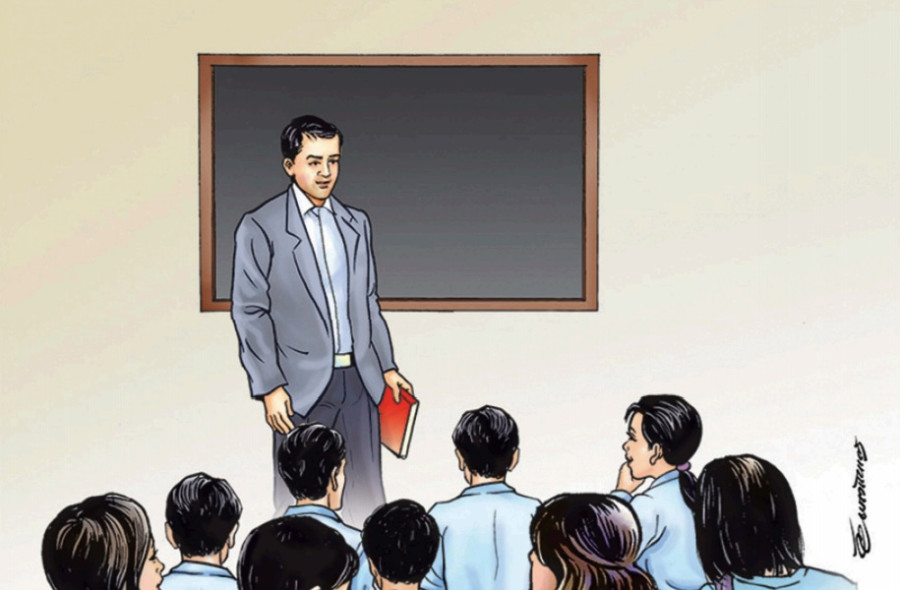National
Schools can’t pay teacher salaries as they are not allowed to collect fees
With the pandemic worsening, the future remains uncertain and the federal government says local governments should look into the matter.
Tsering Ngodup Lama
On March 19, when the government announced the closure of schools to curb the spread of Covid-19, Akash (name changed), a mathematics teacher at a private school in Kathmandu, wasn’t very worried. He thought that schools would reopen in a few weeks and he’d go back to taking classes.
“I had no idea it would last this long. In the 15 years that I have worked as a teacher, this is the longest I have gone without teaching,” said Akash. “I have never had this much free time in many years.”
For Akash, the free time has come at a huge personal expense. “Ever since the school closed, I haven’t received a single rupee in salary,” said Akash.
Akash’s case is not an outlier among the country’s private school teachers. Since the schools closed, the majority of private school teachers haven’t received their salaries, and those who have, have received only a fraction of their total salaries, according to teachers.
This has left many private school teachers struggling to make ends meet.
According to Tika Ram Puri, chairperson of Private and Boarding Schools’ Organisation Nepal (PABSON), schools are unable to pay the teachers’ salaries because the government has directed schools not to collect student fees.
“Student fees are the only source of our revenue, and with no revenue coming in, how are schools supposed to pay their teachers,” said Puri.
Puri claims that there are around 10,000 private schools in the country and they employ nearly 200,000 teachers although the Economic Survey of 2109-20 the number of schools is less than 6,000 .
“During the lockdown, only around 15 percent of the schools have continued to pay their teachers some salary. Most of these schools are the top schools in the country. The rest 85 percent of schools are in no position to pay salaries,” said Puri.
On April 29, the government informed private schools not to charge students school fees for the months of Chaitra and Baisakh (mid-March to mid-May). It also said that it would provide schools with soft loans if they were facing problems managing expenses.
This, the government said, would ease the financial burden that many have had to bear due to the lockdown.
But private schools objected to the government’s decision stating the decision was made without consulting them.
A few days later, on May 7, the Education and Health Committee of Parliament further reiterated that schools should not charge fees until the situation returns to normal and it also directed schools not to enrol new students.
“Despite the lockdown, schools have been providing online classes with an aim to complete the academic year. Our teachers have been working hard to take these online classes despite the difficult time,” said Puri. “But we can only urge our teachers to continue taking online classes despite receiving no salary or only partial salary.”
What percentage of their salaries teachers get varies from school to school, according to Puri.
There is no data on the number of schools that are providing online classes.
Mukunda Raj Sharma, principal of Little Angels’ School in Lalitpur says that his school has been running online classes from April and paying a partial salary to teachers with its own resources.
“We don’t know how long we can continue to pay teachers’ salaries with our resources,” Sharma said.
In July, private schools threatened to stop online classes if they aren’t allowed to collect fees from students.
“It was only after the government assured us that it would look into the matter that we decided to continue the online classes. But it has been more than a month and the government hasn’t come up with any concrete decision on this matter,” said Puri.
The federal government has passed the buck to local governments.
“We have received complaints about non-payment and delay in payment of salaries. Representatives of the Nepal Teachers Federation have also informed us about it,” said Tulashi Thapaliya, director-general Centre for Education and Human Resource Development, under the Ministry of Education. “However, as the authority to manage schools lies with the local governments now, I believe the respective local governments should take proactive measures in resolving the issues,”
At the receiving end of the tussle are the teachers.
One of the teachers that the Post spoke to for the story was a teacher from a reputed school in Kathmandu.
“Before the lockdown, teachers at our school used to take five classes a day. Ever since we started virtual classes, we have been taking four a day, But our salaries have been reduced significantly,” said the teacher, requesting anonymity. “For the past four months, teachers at our school have only been paid 50 percent of the basic salary. At just Rs 15,000 a month, after paying my monthly rent and internet charges, I have nothing left. I have been making do by taking loans from family and friends for the past several months.”
Hom Kumar Thapa, chairperson of Institutional Schools’ Teachers’ Union, doesn’t believe that private schools are incapable of paying their teachers’ salaries.
“The majority of private schools have made enough profit over the years. But faced with a crisis, they say that they do not have enough funds to pay their teachers,” said Thapa. “Teachers are not even demanding that the schools pay them their full salary during such a difficult time. All we are saying is just pay us a living wage with which we can fulfil our basic needs, and the schools can pay back the remaining portion of our salaries when things return to normalcy.”
PABSON’s Puri disagrees. “Unlike other businesses, the education business is such that owners usually reinvest the profit into the business,” said Puri. “But this crisis has made schools realise the importance of setting up an emergency fund to fall back on times like this.”
Thapa said that he knows of 600 teachers that have been laid off but the number could be more.
“Many schools have stopped renewing contracts of contractual teachers. Some teachers have been let go because they don’t have the technical knowledge needed to conduct virtual classes. And others have been fired by their schools because they wrote on their social media platforms of not having received their salaries,” said Thapa.
“It is a difficult situation for everybody involved—the school, the teachers, and the parents,” said Sharma, the school principal. “And the pandemic seems to be getting worse each day.”
With social distancing becoming the new norm and medical experts advising people to reduce in-person interaction, demand for home tutoring, which is what many teachers rely on to make extra income, has hit an all-time low.
“Before the pandemic, after finishing my time at the school, I used to go and teach mathematics to a ninth-grade student who lives near me. But after the pandemic hit, the family asked me to discontinue the class,” said Akash. “I used to regard teaching as a stable profession but this pandemic and the way teachers have been treated by the schools have made me realise it’s no longer the case.”




 14.24°C Kathmandu
14.24°C Kathmandu















